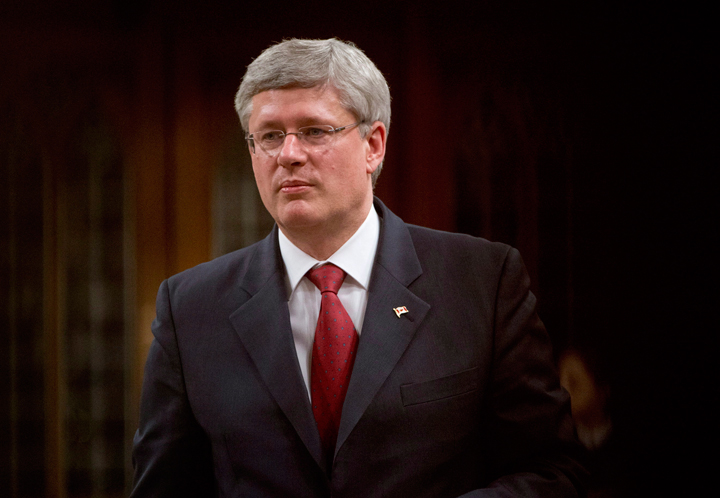OTTAWA – The federal government’s controversial proposed overhaul of election laws illustrates the ruthless, vindictive and hyper-partisan side of Prime Minister Stephen Harper’s character, a former chief of staff says.

But Tom Flanagan says the fact the Conservative government has suddenly backed down on some of the most objectionable aspects of the bill shows another side of the prime minister – his capacity to be pragmatic and realistic.
“The whole episode illustrates the complexity of the man,” Flanagan said in an interview.
As originally proposed, Bill C-23 would muzzle the chief electoral officer, hive the investigator of election law breaches off Elections Canada, boost campaign spending and donation limits, create a loophole that would allow rich, established parties to spend untold millions more during election campaigns and potentially disenfranchise tens of thousands of Canadians by ending the practice of vouching for voters without proper ID.
Flanagan noted that Harper has had “this antipathy to Elections Canada” for decades, dating back to his time as head of the National Citizens Coalition, when he challenged limits on third party campaign spending all the way to the Supreme Court. That hostility was exacerbated by the watchdog agency’s successful prosecution of the Conservative party for orchestrating a scheme to spend more than $1 million over its spending limit during the 2006 campaign.
“So, the initial version of the bill really did seem to be aimed at Elections Canada, taking away powers, clipping what it can do and, along the way, putting in some features that would appear to help the Conservatives at the expense of other parties,” Flanagan said.
“So you might say that bill, the original bill, may have expressed the vindictive side of the prime minister, you know, pay-back time.”
Last Friday’s partial climb-down, however, showed Harper’s pragmatic side, he added.
Pierre Poilievre, the minister responsible for democratic reform, announced that he’s willing to drop the campaign spending loophole, unmuzzle the chief electoral officer and institute an alternative to vouching, among other things.
While polls suggest most Canadians have not been paying attention to the controversy, Flanagan, who has been cut out of Harper’s inner circle for some years, speculated that the prime minister may have feared the near-universal expert criticism of the bill would eventually cause the public to sit up and take notice.
“If you can make a plausible charge that one party is rigging the rules of the game to suit itself, that’s something that is potentially very damaging. And that was the way that it was unfolding so I think they took, I would say, the right decision to back off some their changes that were hard to defend.”
The handling of the file is typical of Harper, Flanagan added.
“Politics with Stephen is always exhausting. It’s never smooth and straightforward. He is combative and gets in this highly partisan frame of mind but often you’ll get a much more realistic denouement.”
In his latest book, Persona Non Grata, Flanagan writes that he quit as Harper’s chief of staff in 2005 and went back to teach at the University of Calgary because he was “tired of all the psychodrama.”
“I was also worn out from trying to work with Harper. He has enormous gifts of intelligence, willpower, and work ethic; but there is also a dark, almost Nixonian side to the man,” he writes.
“He believes in playing politics right up to the edge of the rules, which inevitably means some team members will step across ethical or legal lines in their desire to win for the Boss. He can be suspicious, secretive, and vindictive, prone to sudden eruptions of white-hot rage over meaningless trivia, at other times falling into week-long depressions in which he is incapable of making decisions.”
The important point, Flanagan said in the interview, is that despite his complicated personality, Harper has managed to succeed politically. However, he said the cost of that success has been an ever-shrinking inner circle around the prime minister as insiders quit or get thrown under the bus.
Flanagan has the distinction of having both quit and been thrown under the bus. His close personal relationship with Harper ended shortly after he returned to academe and wrote a book about the prime minister’s rise to power.
Last year, Harper’s office joined the public “mobbing” of Flanagan after he challenged conservative orthodoxy that jail time might not be the best way to punish the viewers of child pornography for their “taste in pictures” – remarks that were secretly videotaped and posted on You Tube under the misleading caption that Flanagan was “okay with child pornography.” Without waiting for any explanation by Flanagan, a spokesman for Harper called the remarks “repugnant, ignorant and appalling.”
Flanagan was similarly instantly disowned by Alberta’s Wild Rose Leader Danielle Smith, former Reform party leader Preston Manning and the University of Calgary. He was dumped as a CBC political commentator and saw speaking engagements cancelled.
Persona Non Grata is a detailed account of “the Incident,” as Flanagan refers to it. More broadly, it’s an examination of how instant communications in the Internet age is, in Flanagan’s opinion, leading to the death of free speech.



Comments